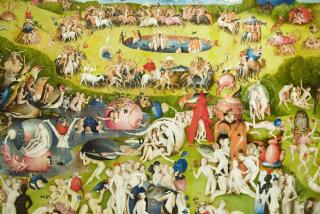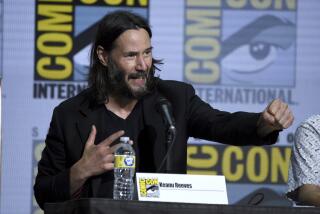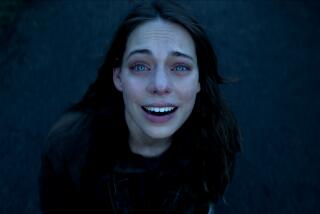Review: China’s most popular science fiction writer, Cixin Liu, brings his spectacular trilogy to an end
- Share via
It’s a good time to be an alien hunter. In August astronomers discovered Proxima b, a potentially life-supporting planet only 4.2 light-years away. Not long after, news surfaced of a possible signal coming from HD164595, a star in the Hercules constellation, first noticed by Russian scientists in 2015. Then there’s KIC 8462852, better known as Tabby’s Star, a body whose inexplicable light fluctuations have inspired a rash of speculation. Are we finally going to learn that we’re not alone? If so, will it be good news?
For Chinese science fiction writer Cixin Liu, the answer is almost certainly no. Like Stephen Hawking, who has long warned about the dangers of sending messages into space, Liu’s vision of extraterrestrial contact is anything but peaceful.
In his Hugo Award-winning 2006 novel “The Three-Body Problem” (translated into English by Ken Liu in 2014), Liu described a first contact scenario in which Chinese radio astronomer Ye Wenjie discovers a species called the Trisolarians, so called because their home world circles three suns in an unstable orbit. Though the Trisolarian who receives her message warns her of danger, she persists in communicating anyway. Having watched her father get beaten to death with belt buckles during China’s Cultural Revolution, she feels that society can use an intervention.
But even Ye Wenjie doesn’t anticipate the consequences of her discovery. Upon learning about Earth, the Trisolarians send a fleet to wipe out humanity and take over its real estate. In the two sequels to the novel — “The Dark Forest,” which appeared in English last year, and now “Death’s End” — Liu describes humanity’s effort to confront the most extreme crisis it has ever faced.
Liu is a maximalist, and the scope of his books allows him to explore all sorts of sci-fi interests. He writes about the effects of hibernation technology on society, artificially constructed parallel universes, an enemy that has mastered near-perfect surveillance abilities and a video game-based religious cult. Liu is also a maximalist in structure; while the first two books in the trilogy told a relatively linear story, “Death’s End” doubles back to the beginning of the “Crisis Era” to re-tell that history from the perspective of another character, Cheng Xin.
Xin is an aerospace engineer who works on a far-fetched effort to send a preserved human brain into space. Although the brain is technically dead, Xin and her colleagues hope that the Trisolarians will have the technology to revive it, thus providing humanity with an agent in the Trisolarians’ midst. Because the brain isn’t expected to reach its destination for hundreds of years, Cheng Xin is put into hibernation.
When she wakes up 264 years later, it turns out that the brain went off course long ago and hardly anyone remembers it anymore. But because she happens to own a star, given to her by the brain donor as part of another short-lived program, Cheng Xin has become wealthy and famous. She is soon called upon to defend humanity in what has become a state of mutually assured destruction with the Trisolarians. From here, “Death’s End” continues past the time frame of its predecessors, stretching almost to the end of the universe.
With such a dramatically expanded temporal canvas, it’s no surprise that Liu also expands the alien cast. In “Death’s End” spaceships encounter mysterious artifacts when they pass through a region of fourth-dimensional space, and we meet a killer super-civilization, which wages war by altering the laws of physics. But like a lot of sci-fi writers, Liu focuses less on the aliens than on the effect their existence has on humanity.
In general, Liu takes a dark view of the world. In the second book in the series he posited that the universe is essentially a “dark forest,” populated by predatory species that will wipe out lesser beings in an instant. Though most intelligent life forms know well enough to keep quiet, “there’s a stupid child called humanity, who has built a bonfire and is standing beside it shouting, ‘Here I am! Here I am!’”
Yet his depiction of Earth civilization in “Death’s End” is charitable. Society goes through some rough spots, but it learns from its mistakes and prioritizes democracy and human rights over military panic. The story is told primarily from the point of view of Chinese characters — a welcome reminder that sci-fi scenarios don’t exist within an exclusively English-speaking world — but his future society is international, with political bodies like the United Nations taking on ever-greater roles.
Unfortunately, humanity’s desire for peace and prosperity also undermines its survival. It’s a dangerous universe out there, Liu argues, and a global social welfare state may not be equipped to deal with it. Such ideas make Liu’s books compelling reading, and “Death’s End” is the most mind-bending of them all.
While Liu’s humanity on the whole is conservative, some characters — both heroes and antiheroes — are determined to save civilization at all costs. In “The Dark Forest,” an officer hijacks a starship and takes off into deep space because he believes that Earth will be defeated in the coming war with Trisolaris. The main character in that novel, Luo Ji, achieves a standoff with the alien invaders because of his willingness to destroy humanity as well. And in “Death’s End” we encounter Thomas Wade, an American intelligence officer who is prepared to wage a horrific civil war in order to pursue transformative research into light-speed travel.
Yet as a novelist Liu has weaknesses that are impossible to ignore: These characters are exclusively men. Liu’s women, in contrast, tend to be nurturing, sentimental and weak. While Xin’s motivations are pure, her inability to make hard choices threatens to be disastrous. “She understood for the first time her own feelings toward this new world: maternal instinct,” Liu writes. “Subconsciously, she saw everyone in the new world as her child, and she could not bear to see them come to harm.” It is women, Liu implies, who are to blame for humanity’s softness, and who are thus responsible for its potential destruction.
Such passages point not only to sexism, but to poor characterization generally. Although the books are full of thrilling ideas and scenarios, the characters are little more than cutouts, with gender stereotypes providing the most obvious pattern. This is an unforgivable defect, since science fiction long ago progressed beyond simplistic tales of macho warriors in space.
Even with its flaws, however, Liu’s picture of humanity’s place in the cosmos is among the biggest, boldest and most disturbing we’ve seen; perhaps it’s no wonder that the author himself succumbs to the comfort of familiar parental archetypes. Fortunately, Liu remains true to his dark vision. In this terrifying world, neither mommy nor daddy can save us.
Glinter is a freelance writer and critic. His work has appeared in the New Republic, the Paris Review and the Boston Globe, among other publications.
::
Cixin Liu
Tor: 608 pp., $26.99
More to Read
Sign up for our Book Club newsletter
Get the latest news, events and more from the Los Angeles Times Book Club, and help us get L.A. reading and talking.
You may occasionally receive promotional content from the Los Angeles Times.







